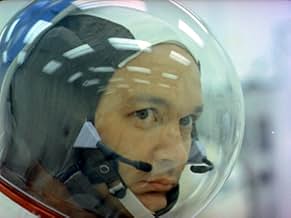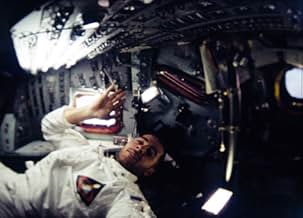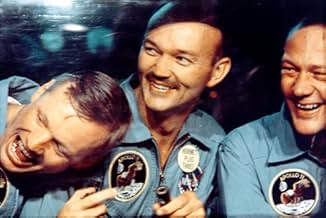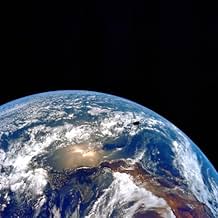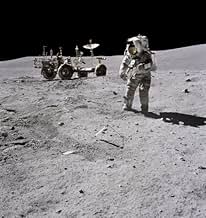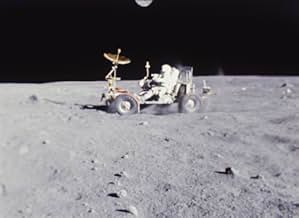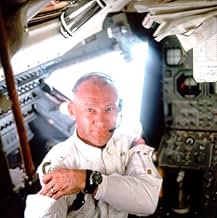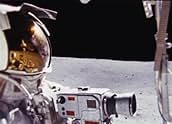IMDb RATING
8.0/10
7.1K
YOUR RATING
The crew members of NASA's Apollo missions tell their story in their own words.The crew members of NASA's Apollo missions tell their story in their own words.The crew members of NASA's Apollo missions tell their story in their own words.
- Awards
- 6 wins & 13 nominations total
Jim Lovell
- Self
- (as James Lovell)
Edgar D. Mitchell
- Self
- (as Edgar Mitchell)
Dave Scott
- Self
- (as David Scott)
William Anders
- Self
- (archive footage)
Neil Armstrong
- Self
- (archive footage)
Stephen Armstrong
- Self
- (archive footage)
Viola Armstrong
- Self
- (archive footage)
Jules Bergman
- Self
- (archive footage)
Frank Borman
- Self
- (archive footage)
Roger B. Chaffee
- Self
- (archive footage)
Yuri Gagarin
- Self
- (archive footage)
Featured reviews
10Kwp
There have been many documentaries about the technical issues of getting to the Moon, but this one focuses more on how the astronauts felt about it all. At turns funny (Buzz Aldrin admits he relieved himself right before stepping on the Moon because it was about the only spare time he was going to have for the next two hours), inspiring (Jim Lovell talking about reading from Genesis while orbiting the Moon), and poignant (several of the astronauts talk about the Apollo 1 fire), it's a riveting piece of film-making.
The footage itself switches between the "talking heads" of the astronauts and imagery depicting what they're talking about, loosely following the chronology of the space age, from Kennedy's declaration of the ambition to go to the Moon to the later Apollo missions with the lunar rover. There aren't any revelations in the mission footage, but then all that's been combed over many times. However, it's well put together and everything is tied in.
I got to see this film at a special showing at the Goddard Space Flight Center. When the film was over, the auditorium full of space geeks gave the director a standing ovation. I think it was well-deserved. While he humbly noted "It's you rocket scientists who really did this - I just put a film together," perhaps - as he also noted - this film will help inspire another generation as we take the next great leap into space, this time to Mars.
The footage itself switches between the "talking heads" of the astronauts and imagery depicting what they're talking about, loosely following the chronology of the space age, from Kennedy's declaration of the ambition to go to the Moon to the later Apollo missions with the lunar rover. There aren't any revelations in the mission footage, but then all that's been combed over many times. However, it's well put together and everything is tied in.
I got to see this film at a special showing at the Goddard Space Flight Center. When the film was over, the auditorium full of space geeks gave the director a standing ovation. I think it was well-deserved. While he humbly noted "It's you rocket scientists who really did this - I just put a film together," perhaps - as he also noted - this film will help inspire another generation as we take the next great leap into space, this time to Mars.
The Apollo moon landings of the late 1960's and early 1970's have been the subject of countless documentaries over the nearly forty years since they occurred. Of all of them, only two films have captured the spirit of Apollo and of the men who took the journey. One of them is Al Reinert's 1989 masterpiece For All Mankind. The other is this film: In The Shadow Of The Moon. And this film easily rivals For All Mankind for the position of best Apollo documentary.
This film takes the idea behind For All Mankind and takes it to the next level. For All Mankind showed us the astronauts as they were then with narration from interviews. In The Shadow Of The Moon, as I wrote, goes the next step further. It shows the astronauts not only as they were, but as they are now. The difference is often times amazing. To go from young fighter pilot to being one of the few men to have left our planet must have been an amazing journey as the film shows and these men prove it. Like For All Mankind, their narration and appearances are the heart and soul of the story being told.
The body of the story is the footage. Where as For All Mankind brilliantly combined all the footage into one large mission, this film doesn't to a degree. It shows us highlights from the program including Apollo 8 and Apollo 11 and then makes a conscience effort not to confuse missions together. This allows for clarity that many have complained about being missing from For All Mankind. But this clarity also allows for something else as well. It allows for depth in story.
That depth can be felt. The truly great thing about this film is that these images, which so many of us are use to seeing on a small television screen, are shown on a big screen. Only on a big screen can one see and feel the depth of the journey that was Apollo. The film has the ability to take images seen many times and bring context and emotion to them. In particular, the footage and still images of the Earth as taken by the astronauts is awe-inspiring. In fact, seeing the famous Earth-rise image from Apollo 8 brought me to tears. And for once, I am not ashamed to admit it.
To be frank, In The Shadow Of The Moon is an amazing piece of work. Not since For All Mankind as a film of any size, shape, or form captured the spirit of Apollo. This is a film about a dream, the men who lived it, and its legacy not only for them but for us as well. I beg you to see this film. Only after that and viewing For All Mankind can one understand not only the legacy of Apollo but our need to explore Space.
This film takes the idea behind For All Mankind and takes it to the next level. For All Mankind showed us the astronauts as they were then with narration from interviews. In The Shadow Of The Moon, as I wrote, goes the next step further. It shows the astronauts not only as they were, but as they are now. The difference is often times amazing. To go from young fighter pilot to being one of the few men to have left our planet must have been an amazing journey as the film shows and these men prove it. Like For All Mankind, their narration and appearances are the heart and soul of the story being told.
The body of the story is the footage. Where as For All Mankind brilliantly combined all the footage into one large mission, this film doesn't to a degree. It shows us highlights from the program including Apollo 8 and Apollo 11 and then makes a conscience effort not to confuse missions together. This allows for clarity that many have complained about being missing from For All Mankind. But this clarity also allows for something else as well. It allows for depth in story.
That depth can be felt. The truly great thing about this film is that these images, which so many of us are use to seeing on a small television screen, are shown on a big screen. Only on a big screen can one see and feel the depth of the journey that was Apollo. The film has the ability to take images seen many times and bring context and emotion to them. In particular, the footage and still images of the Earth as taken by the astronauts is awe-inspiring. In fact, seeing the famous Earth-rise image from Apollo 8 brought me to tears. And for once, I am not ashamed to admit it.
To be frank, In The Shadow Of The Moon is an amazing piece of work. Not since For All Mankind as a film of any size, shape, or form captured the spirit of Apollo. This is a film about a dream, the men who lived it, and its legacy not only for them but for us as well. I beg you to see this film. Only after that and viewing For All Mankind can one understand not only the legacy of Apollo but our need to explore Space.
And I mean it. The footage and stories in this movie were like nothing I've ever seen. Nor have many others because this film includes new footage and stories of the Apollo space missions never seen nor heard. I went to an advance screening at the Sarasota Film Festival and I was extremely impressed as was the rest of the crowd. There was a very long standing ovation at the end of the movie. The film includes at least one member from each of the Apollo missions telling there stories of the process they went through while preparing to land on the moon. It contains the remarkable footage filmed by the crew members of each mission. If you truly want to be left see a movie that will leave you full of excitement and amaze you must see this movie. The host of the film said this film was the reason movies should be made and he was nothing short of the truth.
Bravo to everyone involved in this great film. I just caught it at the 16th Philadelphia Film Festival. Director David Sington answered questions eloquently and patiently as I sat stunned after the film. Having read every Apollo astronaut biography I know to exist I didn't think I'd learn much in the way of facts from the movie, but it turns out there were a couple of things. It is great to see these men who gave so much to my generation talking about the experience decades later. They are wiser and gentler people than when they flew the spacecraft. Sington stated that he wanted to show the events from the point of view of the astronauts. He succeeds, and the experience is moving and meaningful to everyone who looked out from this world in a state of wonder. The Apollo program remains something similar to Leonardo's sketch of a helicopter--an idea ahead of its time technologically, politically and economically, here at the very start of humanity's adventure in the Universe, only a few thousand years after we started using agriculture and so on. When future generations wonder what was going on during the Apollo decade I think this movie is one of the things they'll be looking at.
From 1969 to 1972, America put 12 men on the moon in nine missions. Eight of the surviving crew members (notably absent is the reclusive Neil Armstrong) talk about their adventures in the documentary In the Shadow of the Moon with less of the engineering and more of the philosophy, a bit different from the dramatic renditions of The Right Stuff, Apollo 13, and HBO'S From Earth to the Moon.
The excellence of this version is the articulate, close up, talking heads of the astronauts, who are more handsome in their late 70's than they were in their late 20's, a testimony to space athletes who keep themselves fit forever. Besides their reflective narrations (for instance, Mike Collins is full of insights and glamorous details, Jim Lovell could do color commentary for any network), the photography, some of it never seen from NASA archives, is memorable. The earth as blue bubble is beautiful.
The documentary strays somewhat from the reality base by peppering the denouement with sappy, semi-religious contemplations from the narrators about "God's work" and the "fragility" motif. But all in all, this Ron Howard production is a first-rate retrospective about an era for which Americans should be proudthe contrast between the visionary Kennedy and the current blind Bush is painful. Maybe we should send him to the moon?
The excellence of this version is the articulate, close up, talking heads of the astronauts, who are more handsome in their late 70's than they were in their late 20's, a testimony to space athletes who keep themselves fit forever. Besides their reflective narrations (for instance, Mike Collins is full of insights and glamorous details, Jim Lovell could do color commentary for any network), the photography, some of it never seen from NASA archives, is memorable. The earth as blue bubble is beautiful.
The documentary strays somewhat from the reality base by peppering the denouement with sappy, semi-religious contemplations from the narrators about "God's work" and the "fragility" motif. But all in all, this Ron Howard production is a first-rate retrospective about an era for which Americans should be proudthe contrast between the visionary Kennedy and the current blind Bush is painful. Maybe we should send him to the moon?
Did you know
- TriviaOf all the astronauts who appeared in the film, only Buzz Aldrin demanded to be paid.
- GoofsThe 1202 alarm was not a programming error in the Apollo Guidance Computer, but rather a hardware design bug, already documented by Apollo 5 engineers. Since the 1202 alarm had occurred only once during testing, NASA decided to go with the radar hardware with known problems instead of using untested newer alternatives with unknown problems.
- Quotes
Jim Lovell: We changed our plans on Apollo 8. They changed the mission from an Earth orbital type to a flight to the Moon. And it was a bold move. It had some risky aspects to it. But it was a time when we made bold moves.
- ConnectionsAlternate-language version of Universum: Im Schatten des Mondes (2009)
Details
Box office
- Budget
- $2,000,000 (estimated)
- Gross US & Canada
- $1,134,358
- Opening weekend US & Canada
- $38,281
- Sep 9, 2007
- Gross worldwide
- $2,161,369
- Runtime
- 1h 40m(100 min)
- Color
- Sound mix
- Aspect ratio
- 1.85 : 1
Contribute to this page
Suggest an edit or add missing content






